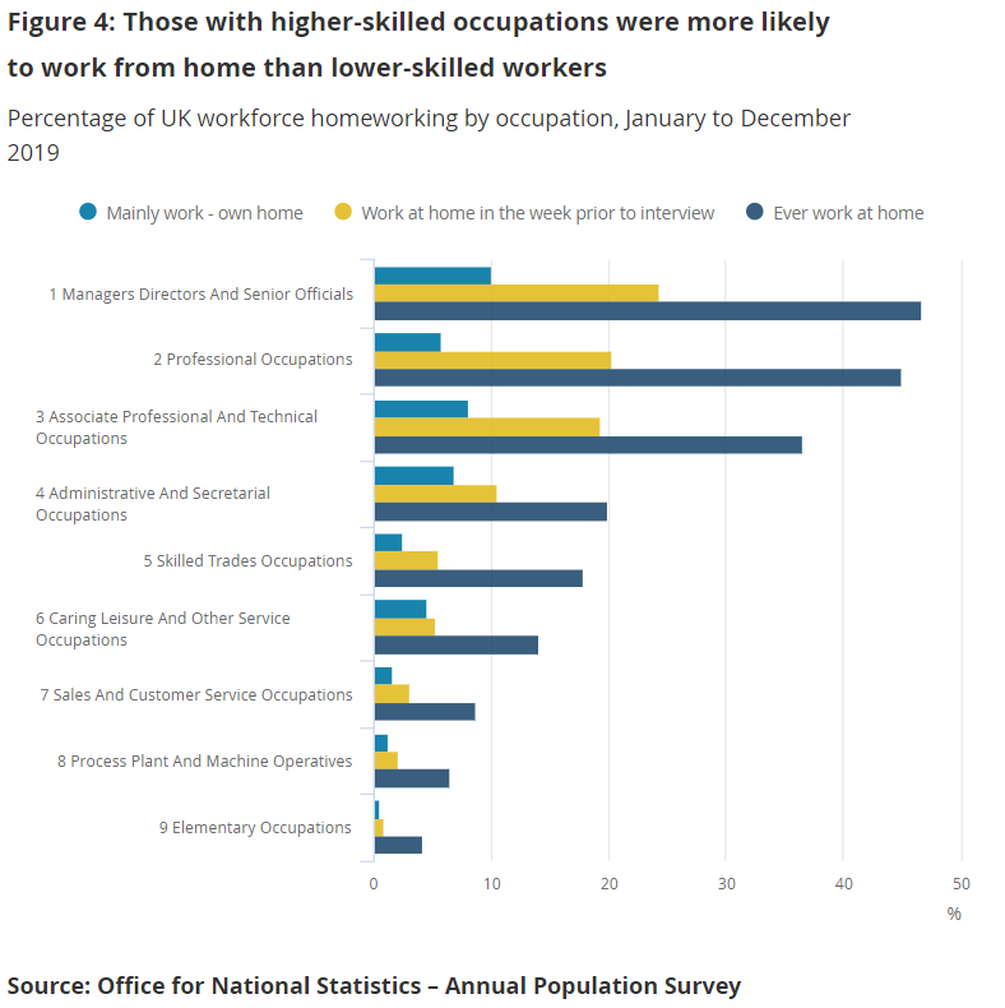Working Remotely
The future of work for all?
In August 2019, for the first time after 18 years of being office-based, I joined Propel International as a remote employee and started working from home. With our head office in Dubai and with me based in the UK, my in-person contact with the team has been limited to occasional meet ups with the other UK-based team members and (at least until early this year) trips to Dubai every couple of months.
This change in lifestyle has really worked for me at this point in my life and career: I have two primary school-aged children and a lot of work experience behind me, good support networks in the area in which I live, and a separate room in which I can work at home. However, COVID 19 has forced remote working on people who are not in similar circumstances and who haven’t made this choice, and it is clear that this experience hasn’t always been positive.
Remote working is heralded by some as the ‘future of work’ for all.
Is it really? Who does it suit and when, and under what circumstances might it be a bad option for employees or employers?
This change in lifestyle has really worked for me at this point in my life and career: I have two primary school-aged children and a lot of work experience behind me, good support networks in the area in which I live, and a separate room in which I can work at home. However, COVID 19 has forced remote working on people who are not in similar circumstances and who haven’t made this choice, and it is clear that this experience hasn’t always been positive.
Remote working is heralded by some as the ‘future of work’ for all.
Is it really? Who does it suit and when, and under what circumstances might it be a bad option for employees or employers?
From 2% to 85%
The past 6 months have brought remote working to the fore. Figures for the UAE show whilst only 2% were working from home prior to movement restrictions, this rose to 85% when restrictions were announced in March. The expectation is that these higher levels are likely to continue for the UAE even once all restrictions have lifted.
For the UK, remote working was more widespread prior to the pandemic, at 30% of the workforce, increasing to 47% during the pandemic. Worldwide, there is a clear trend towards increases in remote working with a 2018 global study indicating that 70% of people worked remotely at least once a week.
There are, however, differences in the prevalence of remote working across different types of roles. Remote working is particularly relevant to ‘knowledge workers’ (employees whose role involves acquiring, creating, and applying knowledge) whose roles can be readily conducted using technology.
For the UK, remote working was more widespread prior to the pandemic, at 30% of the workforce, increasing to 47% during the pandemic. Worldwide, there is a clear trend towards increases in remote working with a 2018 global study indicating that 70% of people worked remotely at least once a week.
There are, however, differences in the prevalence of remote working across different types of roles. Remote working is particularly relevant to ‘knowledge workers’ (employees whose role involves acquiring, creating, and applying knowledge) whose roles can be readily conducted using technology.
The chart above illustrates the differences across occupations in the UK working from home in 2019, which shows a clear pattern with higher-skilled occupations showing higher rates of home working than lower skilled ones.
What is the impact of Remote Working?
A 2020 (pre-pandemic) survey asked respondents to indicate the benefits and challenges of working remotely. ‘Flexible schedule’ and ‘Flexibility to work from anywhere’ were highlighted as the primary benefits, with ‘Collaboration and communication’ and ‘Loneliness’ as the greatest challenges.
Academic research has reported similar findings, with flexibility, work-life balance and autonomy highlighted as positive aspects of remote working. Evidence also indicates that remote workers are likely to have more positive attitudes to employing organisations and are more committed to them. Negative consequences include lack of social support, inability to separate work from home life, and a sense of being ‘always on’.
At an interpersonal level, remote and virtual working can erode trust between team members, and between managers and their subordinates, due to a lack of “mutual knowledge” and common ground that would exist in a physical setting. The consequence of this is that virtual teams tend to experience more conflict (at least in the early days of collaborating), and managers may tend to micromanage when they are not collocated with their subordinates.
It is evident that the negative impacts of flexible working are likely to be unevenly felt across different groups of employees, as detailed below.
Academic research has reported similar findings, with flexibility, work-life balance and autonomy highlighted as positive aspects of remote working. Evidence also indicates that remote workers are likely to have more positive attitudes to employing organisations and are more committed to them. Negative consequences include lack of social support, inability to separate work from home life, and a sense of being ‘always on’.
At an interpersonal level, remote and virtual working can erode trust between team members, and between managers and their subordinates, due to a lack of “mutual knowledge” and common ground that would exist in a physical setting. The consequence of this is that virtual teams tend to experience more conflict (at least in the early days of collaborating), and managers may tend to micromanage when they are not collocated with their subordinates.
It is evident that the negative impacts of flexible working are likely to be unevenly felt across different groups of employees, as detailed below.
Challenge: camaraderie & corporate culture
As a new graduate, the thought of predominantly working remotely would not have appealed to me. Surprisingly, very little has been published on the experiences of graduates or those in their early careers and remote working, but some of the challenges it presents for this group have been demonstrated by experiences during the pandemic.
Tanya de Grunwald, founder of careers website Graduate Fog, and the Good + Fair Employers Club (which lists Google, Channel 4 and KPMG among its members), says: “Whilst a few Graduates like it [remote working], most are desperate to get back to work. They miss the camaraderie, and the immersive experience of being at work. Working from home doesn't give them the same sense of being part of an organisation. Many have far from ideal living situations, whether they're in a cramped flat share or staying with their parents.”
Additionally, some have found themselves starting new jobs during the pandemic with employers having to find ways to provide remote inductions (for some tips see here). Giving employees a sense of an organisation’s culture is extremely challenging through virtual means, and even more so for those starting their first jobs, who are not only trying to understand the specifics of an organisation, but also the world for work generally. De Grunwald comments: “Employers already have concerns that this cohort will need more help with office etiquette once they do come back in. For some, remote working has created a misleading picture of how casual everyone is. They may need to teach those people how to interact professionally with more senior people they encounter.”
Tanya de Grunwald, founder of careers website Graduate Fog, and the Good + Fair Employers Club (which lists Google, Channel 4 and KPMG among its members), says: “Whilst a few Graduates like it [remote working], most are desperate to get back to work. They miss the camaraderie, and the immersive experience of being at work. Working from home doesn't give them the same sense of being part of an organisation. Many have far from ideal living situations, whether they're in a cramped flat share or staying with their parents.”
Additionally, some have found themselves starting new jobs during the pandemic with employers having to find ways to provide remote inductions (for some tips see here). Giving employees a sense of an organisation’s culture is extremely challenging through virtual means, and even more so for those starting their first jobs, who are not only trying to understand the specifics of an organisation, but also the world for work generally. De Grunwald comments: “Employers already have concerns that this cohort will need more help with office etiquette once they do come back in. For some, remote working has created a misleading picture of how casual everyone is. They may need to teach those people how to interact professionally with more senior people they encounter.”
Personality & preferences
Individual preferences are likely to influence the extent to which people are suited to remote working. One study looked at the mental health of remote workers and its relationship with personality. It found that those who were high on the personality traits of Openness to Experience, Agreeableness and Conscientiousness (i.e. those who are curious, cooperative and warm, and reliable and organised) were likely to experience higher levels of mental wellbeing when working remotely. On the flip side, higher levels of Extraversion and Neuroticism (i.e. who tend to be sociable and are less emotionally stable) were associated with lower levels of wellbeing when working remotely. Openness to experience has also been identified as a trait that is predictive of general preferences towards virtual working.
Self-efficacy, a person’s generalised belief in their own abilities, has also been identified as critical to adjustment to remote working, and predictive of structuring behaviours that facilitate the effective delivery of work.
Self-efficacy, a person’s generalised belief in their own abilities, has also been identified as critical to adjustment to remote working, and predictive of structuring behaviours that facilitate the effective delivery of work.
Gender
Some have lauded the shift towards remote working as a real positive for women with families for whom flexible working is particularly critical for sustaining their careers. Certainly, the lockdown experience has demonstrated to many employers, who previously wouldn’t have considered remote working, that it is possible to be productive and work in this way. This may be beneficial to women (and men) who see remote working post-pandemic as a better solution than being office-based.
However, there is other evidence that working women with children were hit disproportionately when both parents started working from home during lockdown, reverting to 1950s-esque splits in domestic duties, even though many women were also working.
The consequence of this was increasing conflict between work and family commitments – particularly for women - and resulting in high levels of emotional exhaustion.
However, there is other evidence that working women with children were hit disproportionately when both parents started working from home during lockdown, reverting to 1950s-esque splits in domestic duties, even though many women were also working.
The consequence of this was increasing conflict between work and family commitments – particularly for women - and resulting in high levels of emotional exhaustion.
Takeaways
Whilst remote working offers great opportunities for many (including me!), it is clear that there are also individuals, roles and circumstances for which remote working is either undesirable or actually impossible. To take account of this, the following need to be considered:
- Remote working policies shouldn’t be applied in a blanket way; it is clear that some people are better suited to remote working than others. Managers need insight into their team’s preferences, skills and unique circumstances to support team members to work remotely.
- Trust can be a significant issue for teams working remotely. Teams should work to build trust through informal social connection.
- Managers need to find ways of supporting their remote teams that strike the balance between being supportive and communicative, whilst not micromanaging them.
- Remote employees need to understand their own needs and preferences around remote working, and all employees working remotely need to develop strategies to delineate their work life from non-work and ensure that they can maintain a balance.



